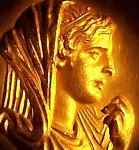Tamar demands her rights
 Tamar’s first husband Er died, leaving her childless.
Tamar’s first husband Er died, leaving her childless. - Her second husband, his brother Onan, masturbated so that she remained childless.
- Her third husband Shelah, the youngest son of Judah and Shua, would not have intercourse with her.
- Judah, the father of these men and Tamar’s father-in-law, should have helped her, but did not.
How could Tamar have a child? What was she to do?
What do you do when the cards are stacked against you – as they were for Tamar? Do you give in, or fight back? Tamar fought back by being a prostitute.
Tamar’s story in the Bible
Tamar was a young Jewish woman who married into the family of Judah, son of Jacob and Leah.
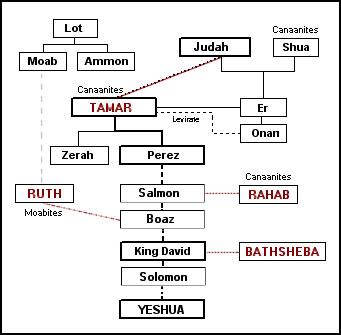 Judah was, by and large, a good man: he had defended his young brother Joseph when all his other brothers had wanted to kill Joseph – he persuaded them to sell Joseph to passing traders instead.
Judah was, by and large, a good man: he had defended his young brother Joseph when all his other brothers had wanted to kill Joseph – he persuaded them to sell Joseph to passing traders instead.
Tamar had married Er, the eldest son, and she hoped for children– this was a Jewish woman’s greatest wish. But her husband practised a form of birth control, spilling his semen, and Tamar did not conceive. Er died, and Tamar was left childless.
Tamar resorted to the Levirate Law, as expressed in Deuteronomy 25:5-10. If a man died childless, his widow could demand sexual intercourse with the dead man’s brother until she bore a son who would inherit the property that would have gone to the dead man, had he lived.
Tamar’s second husband does the same
Er’s younger brother Onan agreed to have sexual intercourse with Tamar, but he practised the same form of birth control as Er, and Tamar did not conceive – ‘onanism’ is now the technical term for uncompleted coition and masturbation.

Why did he do it? Because it meant his share of the inheritance would be substantially less if Tamar produced a son. Money.
Tamar had the right to ask to have sexual intercourse with the third son Shelah, when he was old enough, but time passed and this did not happen. Judah, it seemed, had began to look on Tamar as a jinx, responsible in some way for the death of his two sons.
Tamar solicits as a prostitute
So Tamar began to look for other ways to get what was rightfully hers.
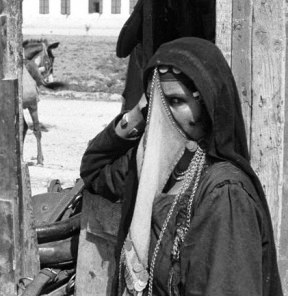 She knew that Judah sometimes used the services of the prostitutes who stood waiting at the city gates, so she disguised herself as one of them – they wore face-coverings that hid their identity. She took the chance that Judah would not know it was his own daughter-in-law who approached him.
She knew that Judah sometimes used the services of the prostitutes who stood waiting at the city gates, so she disguised herself as one of them – they wore face-coverings that hid their identity. She took the chance that Judah would not know it was his own daughter-in-law who approached him.
Then she waited for him at the side of the road and solicited him when he passed. Only recently widowed after many years of marriage, Judah accepted her offer.
But when it came time to pay, Judah did not have any money. He offered instead to send her a goat from his flock. In the meantime he left his tribal leader’s staff and his personal seal and cord as a pledge.
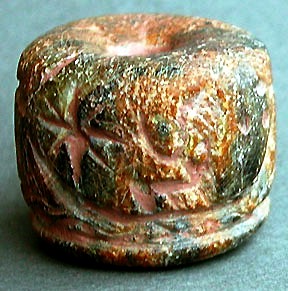
Ancient cylinder seal
The seal, cord and staff had a person’s emblem carved on them, and were items of great personal worth.
Later when Judah’s friend came to make payment to the unknown prostitute and reclaim Judah’s seal, the woman was nowhere to be found. Tamar had gone home, without telling anyone who she was.
But she was pregnant. She had achieved her aim.
Tamar is condemned to death
Some months later when it became obvious she was pregnant Tamar was branded as a whore, and condemned by the unsuspecting Judah to burn to death.
At this dramatic moment Tamar produced the staff, seal and cord. These, she said, had belonged to the father of her child.
Confronted by the evidence, Judah had little choice but to acknowledge that he had been wrong, and that she had been within the law.
A Happy Ending
 In time, Tamar gave birth to not one but two twin boys, whom she named Perez and Zerah. Through Perez she became the direct forebear of King David.
In time, Tamar gave birth to not one but two twin boys, whom she named Perez and Zerah. Through Perez she became the direct forebear of King David.
Extra reading on Tamar
‘Eventually, news of Tamar’s pregnancy reaches Judah, who fiercely sentences her to death for disregarding her betrothal vow. Infidelity during betrothal counted as adultery, and therefore merited the death penalty (Deuteronomy 22:13-21, 23-24). Under Old Testament law, if Tamar was culpable, so was her partner. Consequently, if he but realized it, Judah in sentencing her to death has also condemned himself to the same fate. At the last moment Tamar makes her point, proving that Judas was indeed the father of the child. Judah admits his guilt, “She is in the right, not I” (38:26). She is innocent, he admits, because I forced her to take this action by refusing to give my son Shelah to her in marriage. She, unlike me, was concerned to perpetuate the family line, to produce descendants for Abraham.’
‘Word Biblical Commentary: Genesis 16-50’, Gordon Wenham, p370.

Tamar and Judah, Horace Vernet – a 19th century painting
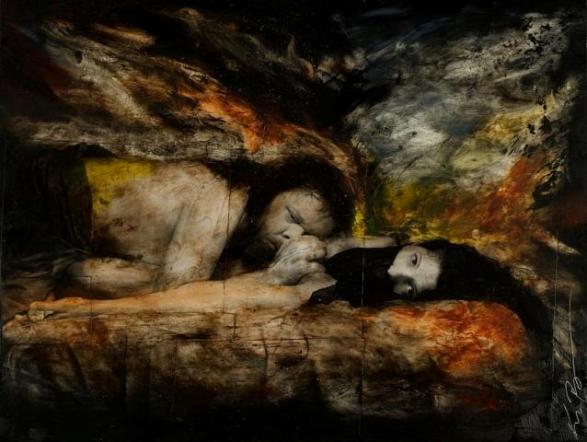
Loss and deception, the story of Judah and Tamar. Artist: Kevissimo. The emphasis in this image is on Judah, and his grief and introspection following the death of his wife (notice that he still wears his wedding ring) and the loss of his two sons; he hardly seems aware of Tamar
© Copyright 2006
Elizabeth Fletcher




